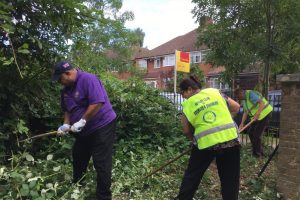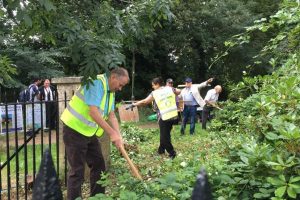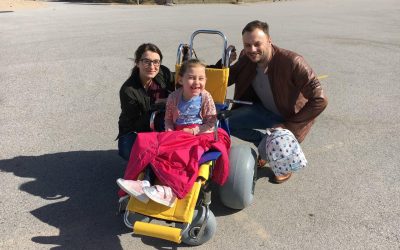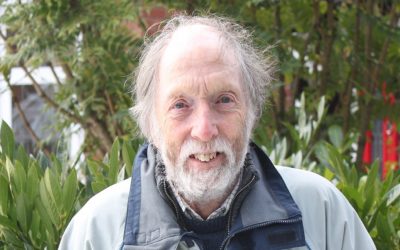About a year ago, Angelie Bharwaney and several members of her Rotary club started a new community project. The group teamed up to tackle trash.
Taking over the maintenance and improvement of a large pathway in Canons Park, in north-west London, the Edgware and Stanmore Rotarians spent the first Wednesday morning of every month collecting pieces of rubbish.
Listen to this article
When passers-by asked, Angelie explained what the group was doing, and they expressed appreciation. “It just took a few hours of my time and it made me feel better,” she says of the beautification effort.
Angelie is not only a Rotarian, but she is also a member of Toastmasters, where helping others is also a central tenet, with members helping each other to gain confidence, while improving communication and leadership skills.
She said her fellow Toastmasters would find it gratifying to collaborate on Rotary service efforts, which range from local projects to humanitarian service around the world.
The alliance between Toastmasters International and Rotary International makes it easier to do that. Though members can’t participate in Rotary service projects as an official Toastmasters activity, they can join in as individuals.
“I think for Toastmasters to join in our service projects would be amazing,” says Angelie, Club President of the Harrovian Toastmasters Speakers in London and a Past President of Edgware and Stanmore Rotary.


Angelie Bharwaney and several members of her club started a new community project to tackle trash
The potential of that shared energy to help others is why Toastmasters and Rotary forged the alliance. Officially announced at the beginning of 2020, it is aimed at capitalising on the strengths of each organisation, helping to further personal and professional growth for members of both groups.
Scott Brown, a Toastmaster in Roanoke, Indiana, says teaming up can help Toastmasters use their skills to positively impact people around the world.
To advocate for their service projects, leaders must communicate why such efforts are vital and inspire volunteers to work together.
“Rotary being such a great service organisation, they can help us take what we’ve learned here and do something better out there,” said Scott, who does leadership consulting for companies in the retail, service, and hospitality industries.
The parallels between Toastmasters International and Rotary are uncanny. The roots of Rotary were founded in Chicago, Illinois, in February 1905, when Paul Harris, Gustavus Loehr, Silvester Schiele, and Hiram E. Shorey gathered in Loehr’s office for what would become known as the first Rotary club meeting.
Toastmasters began as a series of speaking clubs organised by Ralph C. Smedley during his time working for the Young Men’s Christian Association (YMCA). The first unofficial meeting was held in Bloomington, Indiana, in March 1905 – just 134 miles south of Chicago.
Toastmaster was a popular term, which referred to a person who gave toasts at banquets and other occasions.”
As director of education at the YMCA, Smedley saw a need for the men in the community to learn how to speak, conduct meetings, plan programmes and work on committees, and he wanted to help them.
He named the group the Toastmasters Club since ‘toastmaster’ was a popular term, which referred to a person who gave toasts at banquets and other occasions.
Today, Toastmasters is a global, non-profit organisation with more than 16,800 clubs in 143 countries. Its members attend club meetings where they learn how to be more confident speakers, communicators and leaders.
Toastmasters’ vision for the ongoing collaboration with Rotary is to change more lives for the better, and positively impact communities around the world.


Rotary clubs can link with their Toastmasters counterparts at a local level
“Collaborating with Toastmasters will provide our members with even more opportunities to develop and improve their leadership and communication skills,” said John Hewko, General Secretary and CEO of Rotary International.
“In turn, members of Toastmasters can connect with more people, take advantage of new speaking and learning opportunities, and make a difference in their communities through Rotary.”
For Toastmasters, they can benefit by gaining experience of speaking outside of the organisation, strengthening mentoring and evaluation skills, expanding professional and personal networks, as well as broadening perspectives on the world.
Rotary clubs can link with their Toastmasters counterparts at a local level, possibly by hosting a joint meeting to allow both groups to learn more about the other.
For their part, Toastmasters are being encouraged to invite Rotarians to their clubs to give a speech and to be provided, in true Toastmasters’ style, feedback and tips to improve their delivery.
In turn, Toastmasters are being encouraged to speak at Rotary club meetings and events, offering a potentially larger audience.
Such experiences can help members stretch their skills, said Canadian, Deborah Richards, who belongs to both organisations. “I think that would be an interesting challenge for a Toastmaster,” said Deborah from British Columbia.


Rotarians spent the first Wednesday morning of every month collecting pieces of rubbish
Mentoring is a core Toastmasters principle, and Scott Brown from Roanoke, believes strongly in the value of mentoring those outside of Toastmasters, which he calls “real-world experience.”
That’s one reason why he embraces the Toastmasters/Rotary link. Last year, the long-time Toastmaster led a large public speaking workshop for Rotary leaders, and since then he and other Toastmasters have spoken at Rotary clubs in Indiana and, in turn, Rotarians have spoken at their clubs.
Plus, sometimes you might not find a great fit for a mentoring relationship in your Toastmasters club, added Scott. “Sometimes the perfect person to help is sitting in another organisation … like a Rotary club.”
Helping Rotarians improve their speaking skills, he added, is rewarding, because it enables them to more effectively advocate for humanitarian service, including fighting disease, promoting peace, and supporting education and health efforts.
Fact file:
- Toastmasters International is a non-profit educational organisation that teaches public speaking and leadership skills through a worldwide network of clubs.
- Headquartered in Englewood, Colorado, the organisation’s membership exceeds 364,000 in more than 16,200 clubs in 145 countries.
- Since 1924, Toastmasters International has helped people from diverse backgrounds become more confident speakers, communicators, and leaders.
- The Pathways learning experience is Toastmasters’ education programme. This multi-language online learning tool allows you to leverage over 300 practical workplace skills, including: interview preparation; online meeting management; leadership development; project management; and conflict resolution.
“Toastmasters can teach Rotarians to be better at what they’re already doing,” he pointed out.
The Rotary alliance will provide plenty of networking opportunities to build personal and professional connections.
Networking has always been a valuable part of Rotary meetings, noted Deborah Richards, the Canadian Toastmaster and Rotarian.
Rotary collects data on members’ professions, and the clubs’ members represent a variety of businesses and industries. Toastmasters could seek new Rotary colleagues in a specific industry, such as engineering, teaching, or marketing.
“I could see where a Toastmaster might be interested in that networking, especially if they own a small business, for example,” said Deborah, a member of Cloverdale Rotary.
Deborah is programme director in the Health Sciences Division at the Justice Institute of British Columbia. She has participated in such service projects with her Rotary club, such as cleaning local streets and creating scholarships for students.
The aim of the alliance is for Toastmasters and Rotarians to enhance their skills, broaden their networks and increase their positive impact in communities through a new collaboration.
The aim of the alliance is for Toastmasters and Rotarians to enhance their skills, broaden their networks and increase their positive impact in communities through a new collaboration.”
The advent of the global COVID-19 pandemic a year ago has stunted development of the initiative. However, it is intended that the ongoing relationship between the two organisations will begin at grassroots level with local club members learning and working together.
Additionally, Toastmasters will create a set of eight structured communication and leadership development courses for Rotary.
“The strategic alliance with Rotary is exciting and allows both organisations to leverage our unique and similar strengths,” says Deepak Menon, Toastmasters’ International President for 2019-20.
“We look forward to providing our current and prospective members with ongoing additional offerings that meet their evolving needs.”
Back in England, Angelie Bharwaney, an airline administration and customer services manager, said that being in Toastmasters has boosted her confidence as a speaker.
And from Rotary, she has reaped the emotional satisfaction of volunteer service. She is happy about the alliance.
“I think it’s a good thing for both organisations, to be honest,” says Angelie, whose husband, Suresh, is also a Toastmaster and Rotarian. “It will help both of them.”
- Article was first published in Toastmaster magazine, with additional reporting.


























































